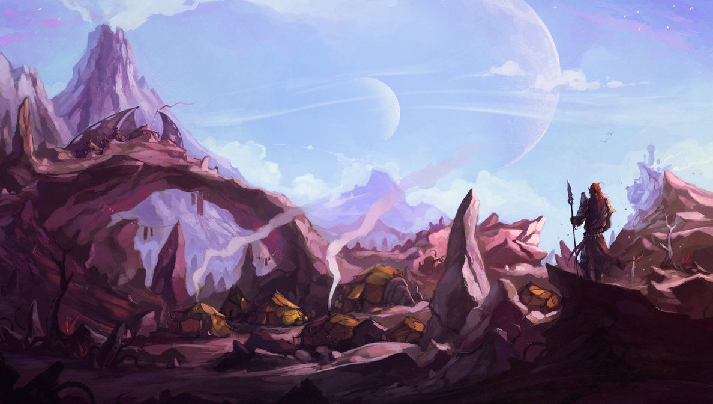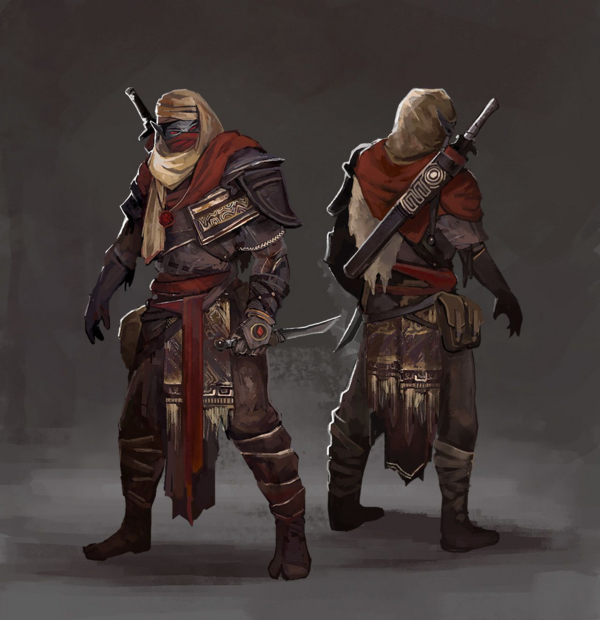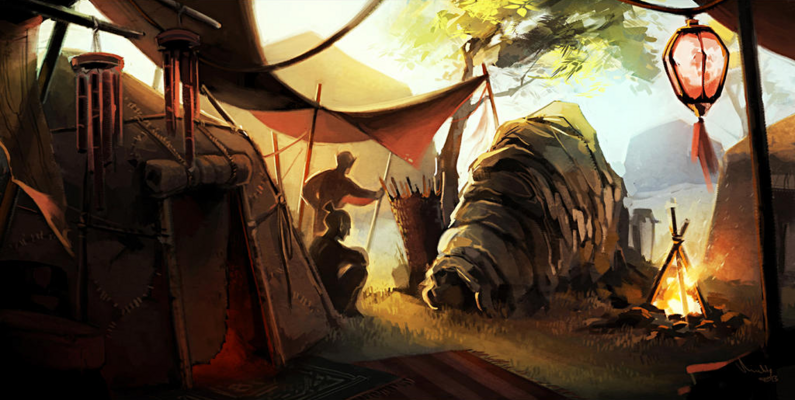Mount Kera
"The history of the Kerathi is one of tragedy and inspiration. It is inspiring because it shows us how even the most obstinate can become valued members of the whole. It is tragic because all the worst of the tale could have been avoided, if only we had all known the gravity of our misunderstandings." -Trace Wisteria, Scholar of the Grove Magnolia.
The Ethno-Geography
Today it would be difficult to tell the historical significance of this part of Arlandrian territory. With the use of strong Elementalism, the once brutal slopes of Kera have been pacified, and life has thoroughly flourished within the nourishing volcanic soil. Yet it was not so long ago that the great Grove Magnolia did not rest nestled in the rolling foothills, nor then did the Lake of Moonlight in the center of the caldera plunge its enchanted waters into the mountain's heart. And while one outside Arlandria would expect the architect of these great works to be a celebrated hero, their legacy is unsung and in some camps their name is greatly reviled.
Because the mountain was not meant to be this way. It was once a place of terrifying extremes. Ash-storms wracked the land from the nearest places to the far horizon. To them, it was home. The Ashlands of Kera were fertile, in a certain brutal way. They were home to yam farms, red rice paddies that grew only in dry heat, and pastures of one-horned Indrik-Beetles and Geodeon Scuttlers, whose crystal hides and chitinous shells were traded to foreigners for the green growth of foreign lands. The ashes of the ancestral dead were spread in the village commons, and their bones (all save the first knucklebone, which was kept for remembrance) were cast into the caldera to see them off into the Grey Beyond.
Their life rested in this place. Their past. Their culture. Their very bodies were the grey of ashfall, and their eyes were the red of flame. All the Aurien of Kera knew was ash. They would have it no other way.
The Forest and The Grove
"The history of Hedera has been one of great joy and life. Where they walk, the ground blooms. When they settle in wastelands, they become green. Who could deny such a paramount gift as the sacrifice of one life for the creation of countless more?"
-Juna, Tree-Minder Aspriant
The arrival of the Arlandrians was only a matter of time. Mount Kera today is within the central periphery of the Arlandrian protectorate. Not close to the capitol, but well within the reach of fourth-generation groves. While the first moment of contact is difficult to discern, as the Kerathi were adept at trading beyond their small ash-drenched realm, it is known that a small village was constructed in the region within 20 years of the arrival of the first Hedera. Magnolia Grace and Magnolia Fervor were a rare breed: Hedera formed at the same time from a conjoined fruit. Heralded as a miracle, their skill in Elementalism and Druidry were beyond compare in their grove. In time, Grace took on a female mien and Fervor a male, though one often sees art of the era (including the famous Grove Tryptic commemorating Fervor's later victory over the Kerathi) portraying them as a single being with two faces. The spiritual implications can be left up to the reader, but the modern consensus is that, while rare, these paired births don't result in shared consciousness.
What is known for certain is that the early town thrived under their leadership. The twins were a perfect pair, with Fervor's drive balanced by Grace's cautious wisdom. In time the population in the outlying settlement, which occupied a valley in the mountain's foothills, grew to exceed even the largest Ashland camp. But such things were not important to the Kerathi, for their religion understood an essential truth about the mountain: all things are temporary. The outsiders did not. Though their envoys were clear that the village would one day have to be abandoned, such things are hard to explain across cultures. To the Kerathi the phrase "you must abandon your village" is not a threat, but a statement. To Magnolia it was the muttering of xenophobic Aurien tribals. As the years drew on, tensions mounted as the tribesmen's words became more vehement. More frustrated.
One can almost understand the difficulty in explaining something beyond the scope of the consensus. Especially when it seemed to involve uprooting their entire livelihood and departing the frontier for good.
The War of Misunderstanding
"We lost our land, and the ash of our forefathers. The Heart of the Mountain lies cold and dead beneath the heaped bones of our slain, and yet we walk the path of ashes even now. Unrepentant. So you want us to pay the price of passage, Highwayman? Alright. Come and take it."
-Ashkhan Valikh, in Ashkhan, Canto III, by Kalen Veln
There are cycles in nature and in life. Rain and drought, farm and fallow, life and death. So too does the earth have a cycle. Vulcanism ravages the land, and fertile soil is spread by rains of ash. Druids are aware of this cycle, but there is debate as to whether it should be welcomed or curtailed. Is the destruction positive or negative? When Kera erupted, the finger-valleys of the foothills turned into races for ash to careen down into the lowlands. Nothing that had not moved to high ground survived. According to the accounts of survivors, Magnolia Grace wielded Druidry to form the trees of the budding grove into a tunnel, allowing many of the villagers to escape. When they gathered to take stock of themselves she was not among them. Later investigation showed that she had become rooted due to exertion, and her body had burned to charcoal along with the rest of the grove.
There is no greater sacrilege to the Arlandrians than the destruction of a Hedera. There is no more terrible loss than the loss of a twin. To Fervor, this was an act of war. Grace had soothed him about the foreigners' gaffes, but to him it seemed that their advice had been a threat. They had not left Kerathi lands, and so the ash had been called down upon them. He had long studied their magic, watched them channel magma and ashfall. He knew in his heart that they were capable not only of great magic upon the Heart of the Mountain, a mythical object they claimed to worship, but also that they were capable of great iniquity.
As the saying goes, "Haste is the mother of all tragedy." Fervor sent word to the nearest garrisons, telling them only that a Hedera had been burned by magic. Within weeks the army he needed was marching into the Ashlands. What followed was a war as brutal as it was short. Druidry wrought terrible casualties on both sides, but the Kerathi were few in number and their settlements were the most defended places under their control. The mountain's peak was not. Fervor and a cadre of his Elementalists wrought a spell of vast consequence there in the caldera. With his mastery of Elementalism he called a great rainstorm, sending mystic waters to fill the caldera as his cadre forced the magma back into the earth. When they were finished, Kera was silent. From the caldera at its peak to the bowels of the earth, mana-drenched water soaked into the volcanic rock. The entire peak had been enchanted to suppress its volcanism permanently. A punishment for his loss.
It was only a short time later that the Arlandrian forces realized what had transpired. The commanders of the invading force called off their attack and regrouped, unsure of how to proceed. They sent to the regional Seers, then to the Capitol. By the time a decision was reached, there was little that could be done. Fervor had seen to it that his revenge was complete. Not only had he quelled the volcano, but he had rooted himself in the spot where their village had been buried. Unwilling to uproot or destroy his new grove, the Arlandrian forces quickly settled a peace with the Kerathi in the way they often did, but with one concession. The remainder could live under Arlandrian protection and be integrated, as any newly-conquered people, or they could maintain their culture and wander among other volcanic slopes. Exile by another name, perhaps, but with a protected status when passing through Arlandria. The latter choice was seen as a consolation for what had been done, though with the stalemate in decision-making it was clear that Kera would never be as it was again. Most of the Ash-Clans chose to leave. At least two recorded clans (Savra and Abaras) integrated, and their Ash Druids are now a subset of the Arlandrian cohort of that type. The remainder have become what we see today.
The war in general is not seen in a good light by Arlandrian historians. Indeed, much regret has been laid towards the actions of Magnolia Fervor. Yet, paradoxically, his work remains. This is made even more ironic in that the Magnolian Grove specializes in the study of history. Its vast libraries, composed out of regret for the loss of culture the Hedera's ancestor caused, are now so valuable that the land cannot be allowed to return to its original state. It seems that, though this has not been forgotten, it also may never be given proper redress.
The Clans Today
The modern Ash-Clans form a vast array of families and kinships, far removed from their ancestral home. But it is peculiar to note that their outlook on the events is unusual. Bereft of home and ancestry, one would expect them to yearn for the days of old and the savage land their hailed from (Arlandrian narratives often position them this way, perhaps out of guilt), but they are an incredibly pragmatic people. They have begun to engage in a nomadic, mercantile lifestyle at which they are remarkably successful. Indeed, the Kerathi have blossomed in their new role. Overall, the Clans form a network that spans the roads of the entire continent. Though there are not many of them, each band moves along a circuit of roads that takes roughly 20 years to complete. At the end of their journey they unite near Kera for a great meeting where all the clans join together to share stories, perform marriages, and trade exotic goods. These grand meetings are incredibly ostentatious and incredibly profitable, as merchants and dignitaries from Arlandria and the realms beyond often attend to look for rare goods.
This is not the only change however. With the loss of its habitat, the Indrik-Beetle is now very rare. Modern Kerathi have moved on to harvesting other animals for their chitin and hide, including the Guka, a native marsh-lizard with a distinctively squat profile. They have also been forced to rely on other forms of transportation. The horse is popular among Isegradian clans, while the Guka-Tsur (Great Guka) is popular among the Arlandrian clans. Some notable exceptions are the Vys of Nalland in Isegrad, who travel atop brass automata, and the Kaval of the Arlandrian Heartwoods who ride on plant-like golems crafted in the likeness of animals. The Clans remain perpetual outsiders, but due to the variety of their wares and the skill of their craftsmanship, the peculiar customs of their people are tolerated in most nations. Bandits and other rogues have also learned, often painfully, that they are not to be harassed. With a view on life best summarized by the famous prosaic line "Come and take it." they confront all obstacles with the same single-minded determination to keep what they own.
When it comes to punishing these criminals, Clan law is equally prosaic. Execution is not practiced except in cases of extreme aberration, such as necromancy or the defilement of the ancestral ash.* The most common punishment is slavery. Whether the captive is a thief from within the clan or a bandit from outside it, forced labor and servitude are seen as means of repairing the damage done to clan society. After a requisite amount of work is added to the whole, the punished individual is left behind. The threat of abandonment is said to be enough to deter most petty crimes among the Clans, and local jurisdictions in Isegrad are reputed to allow them to enslave petty criminals so they will be transported elsewhere (whether this rumor is true or not, this discourages crimes against them by locals).
Produced for the Royal Historical Society
University of Isegrad
Vanya Kerensky, Doctor of Letters.


